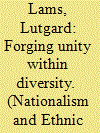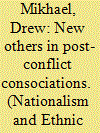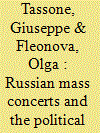| Srl | Item |
| 1 |
ID:
178076


|
|
|
|
|
| Summary/Abstract |
This article presents a theoretical framework on discursive nation-building processes in the Chinese and Taiwanese contexts by drawing on key notions in the discourse-theoretical account about identity construction, hegemonic articulation and myth-building, as proposed by prominent scholars of Discourse Theory, like Ernesto Laclau and Chantal Mouffe (1985). The framework is based on existing literature as well as findings from two case studies about discourses belonging to two different epochs in Chinese history: (1) Chinese and Taiwanese media narratives about the 1997 Hong Kong handover, published between mid-June and mid-July 1997 and (2) Lectures on Nationalism, presented in 1924 by dr. Sun Yat-sen, an early proponent of Chinese nationalism.
|
|
|
|
|
|
|
|
|
|
|
|
|
|
|
|
| 2 |
ID:
178075


|
|
|
|
|
| Summary/Abstract |
This article addresses the question of how the history of political violence targeting individuals on the basis of their race, religion, or ethnicity is memorialized in democracies. To what extent do states’ memorialization practices reflect their democratic values and institutions? The study addresses these questions by bridging the theoretical literatures of memory studies and political regimes. It compares two cases that differ in the circumstances under which they transitioned to democracy, but that have in common the history of political violence of exclusion. The first case includes the Holocaust memorials and monuments in Germany following the reunification, and the second case, the memorialization of the inter-ethnic violence in the 1990s in Bosnia and Herzegovina. By focusing on the memorials, rather than on the characteristics of a political regime, the article argues that memorials that are inclusive of different perspectives and experiences and those that encourage critical reflection and community involvement are more aligned with democratic values. The congruence between the characteristics of the political regime and those of the memorial should not be assumed even in the cases of consolidated democracies.
|
|
|
|
|
|
|
|
|
|
|
|
|
|
|
|
| 3 |
ID:
178077


|
|
|
|
|
| Summary/Abstract |
Debates on consociationalism seek to explain how and why prescriptive power-sharing can support successful ethnic conflict management in post-conflict societies and if the differences between liberal and corporate consociationalism affect system stability. At the same time, a new and growing body of work has begun to examine the previously under-considered effects of power-sharing on “Others,” that is, those communities not in alignment with the included ethnic groups. This paper adds to understandings of liberal and corporate consociational models and their impact on a specific type of Other – “newcomers” – through interviews with civil society organizations representing their interests. Current approaches to the liberal-corporate distinction do not reflect the impact of institutional design on newcomers navigation of power-sharing systems. Through a comparative analysis of newcomer engagement in (liberal) Northern Ireland and (corporate) Lebanon, this paper will reveal how institutional design cultivates path-dependent elite behaviors that negatively impact newcomers through different policy responses.
|
|
|
|
|
|
|
|
|
|
|
|
|
|
|
|
| 4 |
ID:
178074


|
|
|
|
|
| Summary/Abstract |
The article traces the transition from the Soviet to the post-Soviet Russian political imaginary as it unfolds at the site of state-sponsored Russian concerts. It contends that the idea of the Russian nation is being invented by translating the Soviet political imaginary, based on the logic of time, into a political imaginary based on the geography of space. The article shows that the political imaginary of Russia does not stand on its own, but is constantly injected with references to the Soviet past, thus generating ambivalence in the collective imagination of the Russian people.
|
|
|
|
|
|
|
|
|
|
|
|
|
|
|
|
| 5 |
ID:
178073


|
|
|
|
|
| Summary/Abstract |
The quest for self-determination on the basis of shared identities motivates many subnational conflicts worldwide, but our understanding of the linkages between identity, contested land, and strategies is incomplete. What role do symbolic territorial attachments play for strategy choice in self-determination demands? I argue that groups tend to escalate their demands if they can exploit mobilization advantages of symbolic territory, creating identity-based territorial focal points for mobilization. I present new data on strategy choice in self-determination demands worldwide between 2005 and 2015. Using multinomial logit estimations, I find that symbolic territory contributes to limited degrees of escalation, and discourages armed conflict.
|
|
|
|
|
|
|
|
|
|
|
|
|
|
|
|